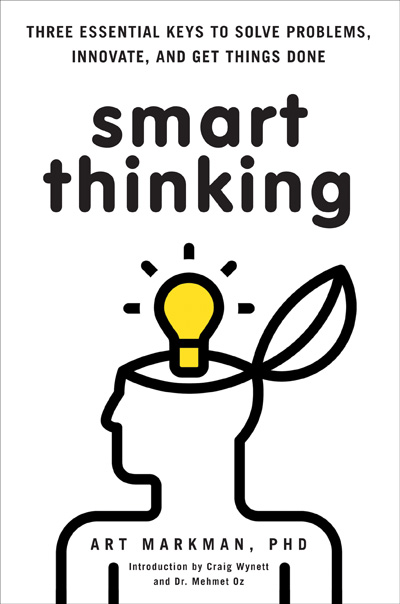Greenback Planet:
How the Dollar Conquered the World and Threatened Civilization as We Know It
By H.W. Brands, professor, Department of History
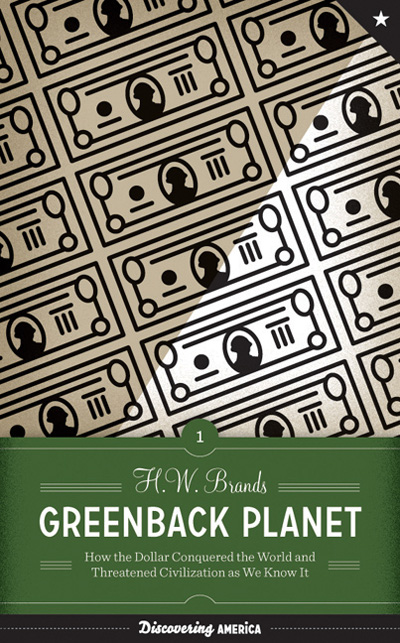 Historian H.W. Brands charts the dollar’s astonishing rise to become the world’s principal currency recounting key episodes in U.S. monetary history, from the Civil War debate over fiat money (greenbacks) to the recent worldwide financial crisis. He explores the dollar’s changing relations to gold and silver and to other currencies and cogently explains how America’s economic might made the dollar the fundamental standard of value in world finance.
Historian H.W. Brands charts the dollar’s astonishing rise to become the world’s principal currency recounting key episodes in U.S. monetary history, from the Civil War debate over fiat money (greenbacks) to the recent worldwide financial crisis. He explores the dollar’s changing relations to gold and silver and to other currencies and cogently explains how America’s economic might made the dollar the fundamental standard of value in world finance.
Brands describes the 1869 Black Friday attempt to corner the gold market, banker J.P. Morgan’s bailout of the U.S. Treasury, the creation of the Federal Reserve, and President Franklin Roosevelt’s handling of the bank panic of 1933. He shows how lessons learned and not learned in the Great Depression have influenced subsequent U.S. monetary policy, and how the dollar’s dominance helped transform economies in other countries after World War II and today. He concludes with a sobering dissection of the 2008 world financial debacle, which exposed the power – and the enormous risks – of the dollar’s worldwide reign.
The Secret Life of Pronouns:
What Our Words Say About Us
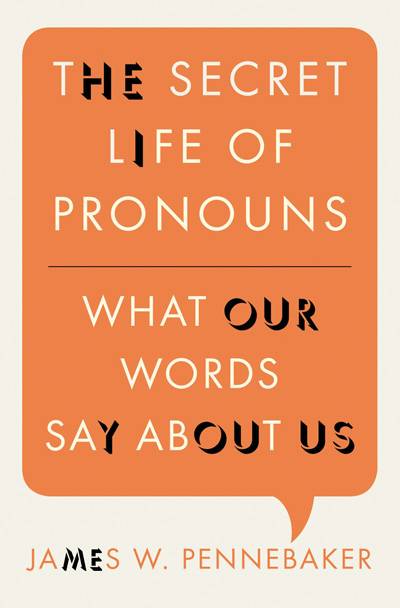 By James W. Pennebaker, professor and chair, Department of Psychology
By James W. Pennebaker, professor and chair, Department of Psychology
The words people use are like fingerprints, revealing amazing insight into their personalities, emotional health, thinking style, group status and relationships. Social psychologist James W. Pennebaker uses his groundbreaking research in computational linguistics to analyze pronouns, articles, prepositions and a handful of other small function words.
He’s been able to detect everything from when a person is lying to how well his or her relationship is going. He even delves into politics, discovering why President Barack Obama uses “I” less than any modern president of the United States.
The Names They Found There
By Kurt Heinzelman, professor, Department of English
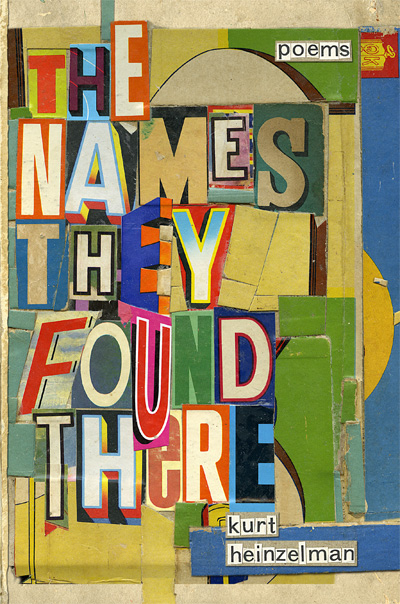 Kurt Heinzelman creates a poetry collection of time, place, landscape and person. His poetry is inclusive in that it holds nothing back; the reader escapes into a memory of place and the people and landscape that make that place. Whether it’s the Marfa lights, Istanbul, or a game of baseball, all of your senses are met with the extraordinary and the equally poignant, ordinary moments of life. A native of Wisconsin, Heinzelman begins his collection with “Where Do You Come From?” Beyond the strong sense of place and time, there are moments of acquired observation and knowledge such as “There are life lessons we learn along the way like the difference between staying somewhere versus living somewhere.”
Kurt Heinzelman creates a poetry collection of time, place, landscape and person. His poetry is inclusive in that it holds nothing back; the reader escapes into a memory of place and the people and landscape that make that place. Whether it’s the Marfa lights, Istanbul, or a game of baseball, all of your senses are met with the extraordinary and the equally poignant, ordinary moments of life. A native of Wisconsin, Heinzelman begins his collection with “Where Do You Come From?” Beyond the strong sense of place and time, there are moments of acquired observation and knowledge such as “There are life lessons we learn along the way like the difference between staying somewhere versus living somewhere.”
“…these poems artfully negotiate what we know by name and what we know by heart,” says Susan B.A. Somers-Willett, author of Roam and Quiver.
America’s Church:
The National Shrine and Catholic Presence in the Nation’s Capital
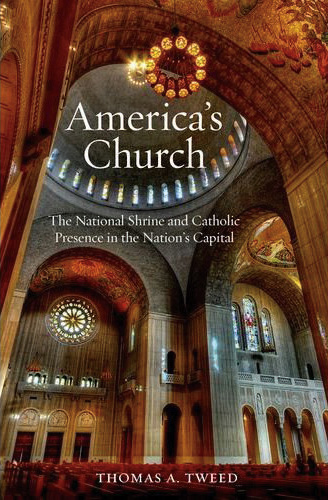 By Thomas A. Tweed, professor, Department of Religious Studies
By Thomas A. Tweed, professor, Department of Religious Studies
Thomas Tweed selects the National Shrine in Washington, D.C. as the viewpoint from which to tell the story of 20th century Catholicism.
He organizes his narrative around six themes that characterize U.S. Catholicism, and he ties these themes to the Shrine’s material culture — to images, artifacts or devotional spaces. He begins with the Basilica’s foundation stone, weaving it into a discussion of “brick and mortar” Catholicism, the drive to build institutions. Throughout, he employs painstaking detective work to shine a light on the many facets of American Catholicism reflected in the shrine.
The Mother Who Stayed
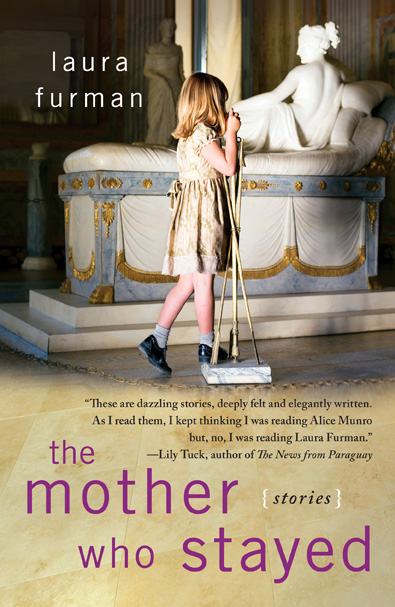 By Laura Furman, retired professor, Department of English
By Laura Furman, retired professor, Department of English
Laura Furman’s book was inspired by a box of 19th century diaries she found in a house she bought in 1972 in upstate New York. While curious and haunted by the mystery of the diaries, she actually didn’t read them for years, until she moved to Texas in 1978.
In nine strikingly perceptive short stories set miles and decades apart, Furman mines the intricate, elusive lives of mothers and daughters — and of women who long for someone to nurture. The book pays homage to the timeless, primal bond between mother and child and is a testament that the relationships we can’t define can be just as poignant, memorable and inspiring as those determined by blood.
A Mess of Greens:
Southern Gender and Southern Food
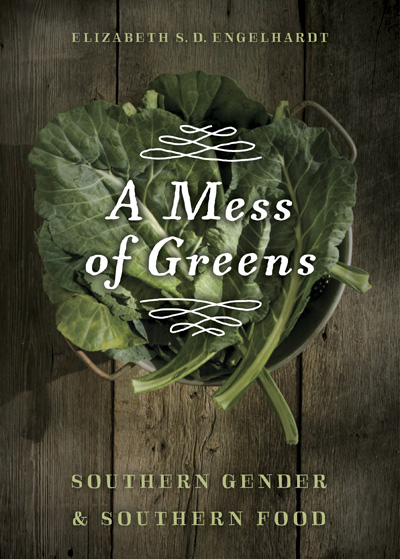 By Elizabeth Engelhardt, associate professor, Department of American Studies and Center for Women’s and Gender Studies
By Elizabeth Engelhardt, associate professor, Department of American Studies and Center for Women’s and Gender Studies
Combining the study of food culture with gender studies and using perspectives from historical, literary, environmental and American studies, “A Mess of Greens” examines what Southern women’s choices about food tell us about race, class, gender and social power.
Five moments in the story of Southern food — moonshine, biscuits versus cornbread, girls’ tomato clubs, pellagra as depicted in mill literature, and cookbooks as means of communication — have been chosen to illuminate the connectedness of food, gender and place. Incorporating community cookbooks, letters, diaries and other archival materials, “A Mess of Greens” shows that choosing to serve cold biscuits instead of hot cornbread could affect a family’s reputation for being hygienic, moral, educated and even godly.
Smart Thinking:
Three Essential Keys to Solve Problems,
Innovate, and Get Things Done
By Art Markman, professor, Department of Psychology
Psychologist Art Markman argues that being smart is not the same thing as being intelligent. Simply put, smart thinking is the ability to develop smart habits to acquire highquality knowledge, and to be able to apply that knowledge whenever you need it. The key is that each of the parts of this formula are skills that can be learned and improved.
The author draws from research in psychology to teach people about how their minds work and then provides evidence-based recommendations for how to improve their thinking. The book emerged out of classes he teaches to executives, but is designed for anyone who wants to improve his or her ability to solve new problems in innovative ways.
Liberty’s Surest Guardian:
American Nation-Building from the Founders to Obama
By Jeremi Suri, professor, LBJ School of Public Affairs and Department of History
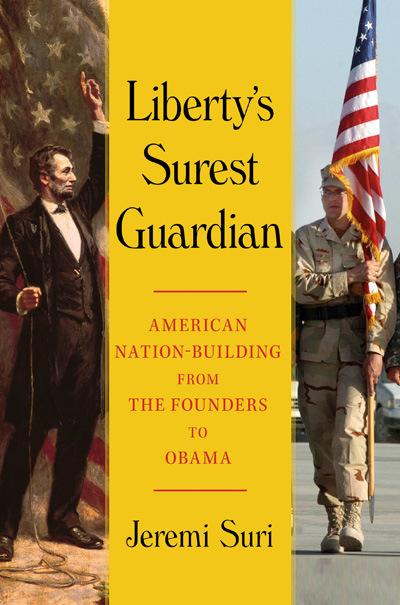 Jeremi Suri looks to America’s history to see what our country has to offer to failed states around the world. Far from being cold imperialists, Suri shows, America has earnestly attempted to export its invention of representative government to failing states throughout the world.
Jeremi Suri looks to America’s history to see what our country has to offer to failed states around the world. Far from being cold imperialists, Suri shows, America has earnestly attempted to export its invention of representative government to failing states throughout the world.
Nation–building can only work when local citizens “own it,” and do not feel it is forced upon them. There is no one way to spread this idea successfully, but Suri has mined more than two hundred years of American policy in order to explain the five “P”s of nationbuilding: Partners, Process, Problem-Solving, Purpose, and People.
Our actions in Iraq, Afghanistan, and Libya will have a dramatic impact on international stability. Suri takes on the idea of American exceptionalism and turns it into a kind of playbook for Obama over the next, vital few years.
Fall Higher
 By Dean Young, professor, Department of English
By Dean Young, professor, Department of English
“Fall Higher” is a new collection of poetry published just days after Dean Young received a life-saving heart transplant after living with a degenerative heart condition for about a decade.
His work contends with the turbulence of love — wryly cataloging mistakes, deterioration of relationships and broken vows. “But don’t despair,” he counsels readers. “There are designs that seem like chaos only because you’re too close.” His humor is sharp, coupled with a heart-earned vulnerability that renders “Fall Higher” his most intimate collection. Young urges us to “fall higher” until “there’s nothing left but hope.”

